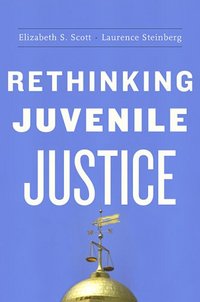

Purchase
Harvard University Press
September 2008
On Sale: September 1, 2008
384 pages
ISBN: 0674030869
EAN: 9780674030862
Hardcover
Add to Wish List
Non-Fiction
What should we do with teenagers who commit crimes? Are they
children whose offenses are the result of immaturity and
circumstances, or are they in fact criminals? “Adult
time for adult crime” has been the justice system’s mantra
for the last twenty years. But locking up so many young
people puts a strain on state budgets—and ironically, the
evidence suggests it ultimately increases crime. In
this bold book, two leading scholars in law and adolescent
development offer a comprehensive and pragmatic way forward.
They argue that juvenile justice should be grounded in the
best available psychological science, which shows that
adolescence is a distinctive state of cognitive and
emotional development. Although adolescents are not
children, they are also not fully responsible adults.
Elizabeth Scott and Laurence Steinberg outline a new
developmental model of juvenile justice that recognizes
adolescents’ immaturity but also holds them accountable.
Developmentally based laws and policies would make it
possible for young people who have committed crimes to grow
into responsible adults, rather than career criminals, and
would lighten the present burden on the legal and prison
systems. In the end, this model would better serve the
interests of justice, and it would also be less wasteful of
money and lives than the harsh and ineffective policies of
the last generation.
Comments
No comments posted.
Registered users may leave comments.
Log in or register now!
| 


 © 2003-2025 off-the-edge.net
all rights reserved Privacy Policy
© 2003-2025 off-the-edge.net
all rights reserved Privacy Policy